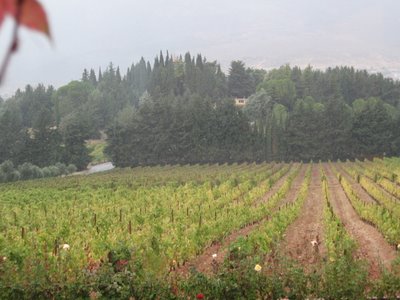Jesus, Bacchus, and modern-day reds and whites

Lebanon, my Lebanese taxi driver said proudly as we left dry and brown Syria en route to Beirut, has the world’s best natural environment. It may be true.
One can experience four seasons in two hours, he continued. Winter on the mountain peaks, summer on the coast, and spring and fall in between.
The in between is the Beqaa Valley, a striking fertile plain framed by Mount Lebanon and the anti-Lebanon range. It is a stronghold of the Shiite militia Hezbollah, as well as one of the oldest wine-making regions in the world. Wine heritage here dates back 5,000 years to the Phoenicians. Later, Jesus turned water to wine in nearby Cana. In 150 CE, the Romans built a temple to Bacchus in Baalbek, today the largest city in the Beqaa.
I visited two wineries yesterday with a friend, as the Beqaa was drenched by a typical, cool fall rain, good for the grapes, I imagined. Lebanon ranks 47th in wine-production in the world, and its wines may be among the most overlooked. Influenced heavily by French techniques over the past 150 years, many of the grapes are French varieties.
Half of the bottles produced by the country’s largest winery, Ksara, is exported to Europe and the United States, our tour guide told us. Fortunately, it is also available in Syrian restaurants and liquor stores.

0 Comments:
Post a Comment
<< Home